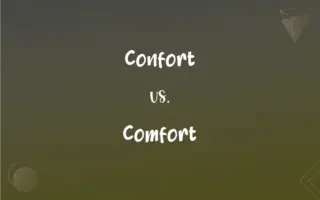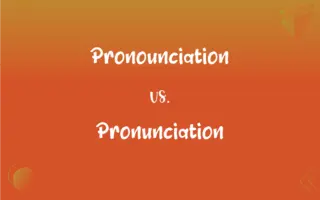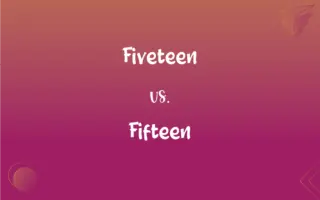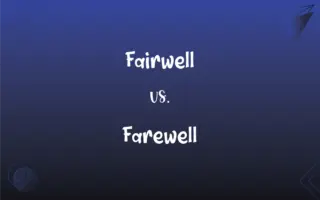Sceintist vs. Scientist: Mastering the Correct Spelling
Edited by Aimie Carlson || By Janet White || Updated on March 9, 2024
Incorrect: Sceintist. Correct: Scientist. A scientist is a professional engaged in scientific research.

Which is correct: Sceintist or Scientist
How to spell Scientist?

Sceintist is Incorrect

Scientist is Correct
ADVERTISEMENT
Key Differences
Visualize a “scientist” with a microscope, linking “sci” to science.
“Sceintist” lacks the “sci” found in “science” and “scientific.”
“Sceintist” has the “e” and “i” reversed; “scientist” has them in the right order.
Remember “sci” as in “science” for the correct spelling.
Correct usage of Scientist
This award is given to the most promising young sceintist.
This award is given to the most promising young scientist.
ADVERTISEMENT
He dreams of becoming a sceintist one day.
He dreams of becoming a scientist one day.
The sceintist made a groundbreaking discovery.
The scientist made a groundbreaking discovery.
A sceintist must be diligent and curious.
A scientist must be diligent and curious.
She is recognized as a leading sceintist in her field.
She is recognized as a leading scientist in her field.
Scientist Definitions
A person with deep knowledge in science.
The scientist won a Nobel Prize.
A professional in scientific research or study.
The scientist presented her findings.
An expert in a specific field of science.
A marine scientist studies ocean life.
An individual contributing to scientific knowledge.
The young scientist was ambitious.
Someone who conducts experiments.
The scientist tested the hypothesis.
A person who is engaged in and has expert knowledge of a science, especially a biological or physical science.
One whose activities make use of the scientific method to answer questions regarding the measurable universe. A scientist may be involved in original research, or make use of the results of the research of others.
One learned in science; a scientific investigator; one devoted to scientific study; a savant.
A person with advanced knowledge of one of more sciences
Scientist Sentences
A young scientist won the award for her research on renewable energy.
A scientist explores the mysteries of the universe.
A scientist often publishes their findings in scientific journals.
A scientist may specialize in fields such as biology, physics, or chemistry.
Marie Curie was a pioneering scientist in the field of radioactivity.
A scientist uses experiments to test hypotheses.
Every scientist contributes to our understanding of the world.
The scientist spent years developing a new vaccine.
The work of a scientist requires a lot of patience and precision.
The goal of a scientist is to expand human knowledge.
Becoming a scientist involves years of study and research.
A scientist must be skeptical, always questioning existing theories.
A scientist needs to be adept at problem-solving.
To be a successful scientist, one must be endlessly curious.
A scientist must communicate their findings effectively.
Scientist Idioms & Phrases
A mad scientist
A scientist who is considered eccentric or is involved in unorthodox or dangerous experiments.
In the movie, the villain was a mad scientist creating monsters.
FAQs
What is the root word of Scientist?
The root word is "science."
Which vowel is used before Scientist?
No specific vowel is commonly used before "scientist."
What is the pronunciation of Scientist?
Pronunciation: \ˈsī-ən-tist\
What is the singular form of Scientist?
Scientist.
Which preposition is used with Scientist?
Prepositions like "of" or "in" are used, as in "scientist in biology."
What is the verb form of Scientist?
There is no verb form; "scientist" is a noun.
Why is it called Scientist?
It's called "scientist" from the Latin "scientia," meaning knowledge.
What is the plural form of Scientist?
Scientists.
Which conjunction is used with Scientist?
Conjunctions like "and" or "or" can be used.
Is Scientist a negative or positive word?
It's neutral but often perceived positively.
Is Scientist an adverb?
No, it's not an adverb.
Is Scientist a vowel or consonant?
"Scientist" is a word; it contains both vowels and consonants.
Is Scientist a collective noun?
No, it's not a collective noun.
How many syllables are in Scientist?
There are three syllables.
Which article is used with Scientist?
Articles like "the," "a," or "an" can be used.
Is Scientist a noun or adjective?
Scientist is a noun.
Is the Scientist term a metaphor?
It can be used metaphorically in some contexts.
Is the word Scientist imperative?
No, it's not imperative.
How do we divide Scientist into syllables?
Sci-en-tist.
Is Scientist an abstract noun?
No, it refers to a specific type of professional.
What is the first form of Scientist?
The first form is "scientist."
What is the third form of Scientist?
It doesn’t have a third form as it's a noun.
What part of speech is Scientist?
It's a noun.
What is another term for Scientist?
Another term could be "researcher."
What is the opposite of Scientist?
There's no direct opposite, but a non-scientist or layperson could be considered opposite.
How is Scientist used in a sentence?
"The scientist worked diligently on her research."
Is Scientist a countable noun?
Yes, it’s countable.
What is a stressed syllable in Scientist?
The first syllable, "sci," is stressed.
Which determiner is used with Scientist?
Determiners like "the," "a," or "this" can be used.
What is the second form of Scientist?
It doesn’t have a second form as it's a noun.
About Author
Written by
Janet WhiteJanet White has been an esteemed writer and blogger for Difference Wiki. Holding a Master's degree in Science and Medical Journalism from the prestigious Boston University, she has consistently demonstrated her expertise and passion for her field. When she's not immersed in her work, Janet relishes her time exercising, delving into a good book, and cherishing moments with friends and family.
Edited by
Aimie CarlsonAimie Carlson, holding a master's degree in English literature, is a fervent English language enthusiast. She lends her writing talents to Difference Wiki, a prominent website that specializes in comparisons, offering readers insightful analyses that both captivate and inform.


































































